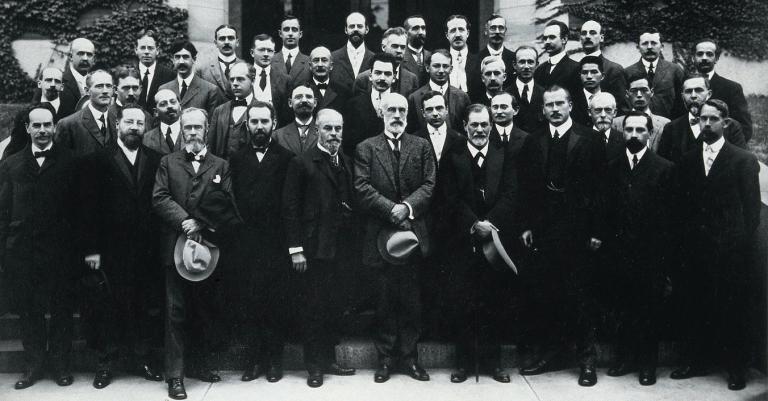Jung does recognize dreams, with respect to the client. He literally disagrees with Freud, his colleague on this point, believing that dreams are indeed real to the client. To assist with dream analysis, the therapist must take the stance that no matter how weird or crazy the dream may sound, it is the client’s reality. The therapist must enter the world of the dream in therapy as a believer, or something of that nature.
Here are two lines of succession in psychology, for those who enjoy Patristic successions. I also mean those who have a general curiosity about the origins of psychology and the main players. I’ve already completed comprehensive national exams years ago in the counseling and marriage and family field.
I’d like to trace both lines back to Vienna. This is where Freud and Jung meet for the first time. These two are very interested in each other’s work. They become part of the dream team of their generation. There are pictures of them among other psychology pioneers of their day, mainly from Europe.

Sigmund Freud is studying from an individualistic analytical perspective in some ways.
Carl Jung is studying individuals, but is also becoming a master of sociological research.
Both are conducting case studies, considered empirical research for their era. Large scale psychological studies are not emerging until the mid-20th century.
Freud vs. Jung on spiritual interaction between people
Neither one denies a spiritual or pseudo-spiritual interaction between people, or peoples. Frued’s list of defense mechanisms is merely one example of how he recognizes these types of interactions. True psychoanalysts still do today. Usually a pschodynamic therapist, in the modern school of Freudian therapy, recognizes if there’s something between client/s and therapist. It should be treated as reality, something to work on for awhile.
Jung starts to recognize cross-cultural symbolism, an area Freud does not dive into as much. His belief is there are similar themes, perhaps narratives, in cultures worldwide. Freud recognizes the relationship between client and therapist. Jung recognizes the relationship between cultures through early forms of case studies and the meta-analysis he is conducting.
As far as the influence of a spiritual mindset, they are similar, yet different.
Freud vs. Jung on dream analysis
They both also have interesting views when it comes to dream analysis. Freud does in fact analyze dreams. However he does not necessarily view them as a form of reality, as he does interrelations, and other aspects of his theory.
On the other hand, Jung does recognize dreams, with respect to the client. He literally disagrees with Freud, his colleague on this point, believing that dreams are indeed real to the client. To assist with dream analysis, the therapist must take the stance that no matter how weird or crazy the dream may sound, it is the client’s reality. The therapist must enter the world of the dream in therapy as a believer, or something of that nature. Recurrent dreams are only worked through in this way.
They are not unlocked as if the client is fixated on the dream, or whatever. Fixation would be a developmental problem in Freud’s theory, one that is largely debated anyway. Therefore, the dream, not recognized as anything numinous by Freud, is revered by Jung, who has conducted global cultural anthropology.
Freud school vs. Jung’s school
There are no real schools yet. Erik Erikson is a protege directly influenced by their work, specifically by their work on developmental psychology of course. He may not be beholden to one or the other. For those who do not know, Erikson’s developmental theory sets the stage for the educational model, particularly in America. He adds the adult stages of development later. James Marcia supplements Erickson’s theory, for what we now call adolescence/young adulthood.
Bear in mind that the sexualized language of Freud’s developmental theory, the deep dives of Jung into cultural development and symbolism, the cut and dry developmental theory of Erikson, and the seemingly dark title of Marcia’s supplemental theory; are all ways we may view the linguistics of these pioneers looking back. However, their language and social scientific explorations, all of them, are apopros for their era.
So far, all of this is like a European thesis. A thesis does not have to be an original idea, but an advancement of the work in a field.
Nonetheless, Freud and Jung eventually part ways. These are some rumors from the academie. They part over the spirituality issue, something Jung seems to be a little farther down the road with – eventually to the point of becoming Christian. There is the possibility that Freud has a spiritual heritage as well from a different faithtribe.
Freud | Jung | Erikson | Kohlberg | Fowler
Of course, Freud becomes popular in some circles. However in real time, Jung is searched for on the internet globally with a higher degree of frequency. Both have their fallacies, if one is trying to accomplish strict Biblical/Theological integration. Neither one of them claims to be developing Theology proper, nor does Erikson or Marcia.
Erik Erikson may be like Justin Martyr in a way. On his way to Rome, knowing he will most likely be martyred, he is writing letters. However, both the Roman Catholic Church and the Orthodox Church love him. He is from the West, but he speaks in Greek. Erikson brings the theories of Vienna to American soil in new ways (not to be martyred of course) but to offer new life to our psychological and educational systems.
Lawrence Kohlberg
Beyond Freud | Jung | Erikson then, the natural successor would be Lawrence Kohlberg. Lawrence does not have a strict developmental theory like Erikson. Lawrence’s theory uses a similar developmental framework. He reaches into the arena of moral development, the first theorist to do so looking back from our vantage point.
Freud offers hints of morality in his developmental theory. Jung is definitely offering moral development, especially if one looks at his work on the archetype narratives cultures develop (ideas that often resurface around the globe).
Erikson’s developmental theory also has to do with interrelations. Those who branch out from Lawrence work with moral development: individuals, interrelations, and also community development.
Lawrence studies with Erikson, but Erikson has studied with Freud. Therefore Lawrence has been influenced by the dream team, including Jung.
James Fowler
James Fowler writes extensively, influences at least one world movement, and develops a community impacting at least half of a well-known metropolis.
You could possibly find his writings alongside of those who have descended from the Jungian camp, if you know where to look. He studies with Lawrence.
One of his Fowler’s contributions is taking the developmental model, and adding stages of faith. This has been recognized around the globe. Faiths or disciplines do indeed develop in similar ways, at times. Those who think Fowler goes too far in applying his theory to non-Christians as well, should start with the educational book:
James W. Fowler, Becoming Adult, Becoming Christian: Adult Development and Christian Faith, Jossey-Bass (Wiley imprint), 1999.
What about the Jungian school?
Jung maintains his studies, writes quite a bit, sees clients, and basically has a castle retreat center near a body of water. He influences countless influencers who are attracted to his social scientific research, as well as those who are attracted to his ground-breaking current and historical anthropologies. His works have now become something like Theological apologetics for his students in at least two disciplines.
He has influenced post-graduate education in Canada at least, where there is no separation of church and state, and at least one ivy-league school on the coast. Furthermore, some in the cinematic world utilize his understanding of world cultures and narratives to develop entertainment today. If you look into his work, it is definitely not Theology proper. He says some things that scholars disagree about, but there are a lot of disagreements between Theologians over classic reads. He leaves plenty of room for the mysterious and numinous, however Carl Jung is going to surprise you.













